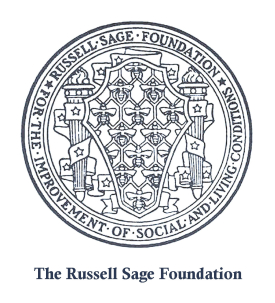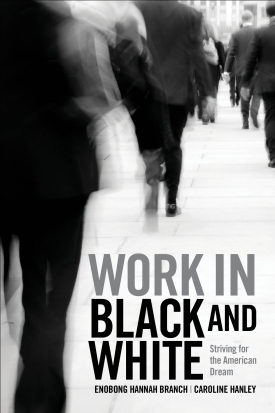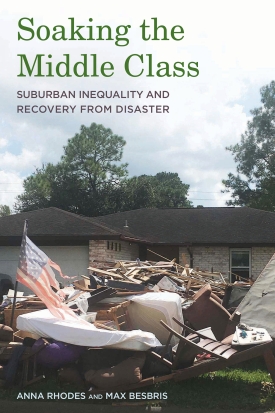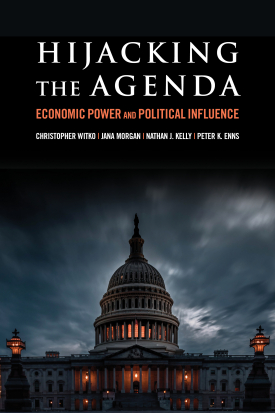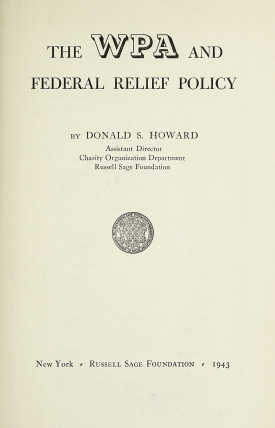“Enobong Hannah Branch and Caroline Hanley have written an insightful book that documents just how fragile the American Dream is and always has been for Black workers. Anyone who wants to understand the complex, nuanced relationship between race, gender, and economic insecurity needs to pick up Work in Black and White immediately.”
—ADIA WINGFIELD, vice dean of faculty development and diversity, professor of sociology, Mary Tileston Hemenway Professor of Arts and Sciences, Washington University in St. Louis
“Work in Black and White deftly weaves Black and White workers’ sense making of their labor market insecurities with clear historical and demographic analyses. ‘Stories have the power to make inequality legitimate,’ the authors write and go on to document the commonalities and divergence in stories told by educated men and women. While Black and White workers share aspirations for security, they part ways on how to understand the barriers to achieving it. Black workers recognize continuities in racism and White nepotism but also tend to believe they have some control over their own futures. Whites misperceive their precarity as a loss of racial privilege, while being blind to their advantaged reliance on White networks to get and keep jobs. Both groups embrace myths around hard work, education, and meritocracy and so are unable to imagine, much less generate, a political agenda to deal with the profound structural weaknesses of the U.S. economy. Read this book.”
— DONALD TOMASKOVIC-DEVEY, professor of sociology and director, Center for Employment Equity, University of Massachusetts, Amherst
“Work in Black and White reminds us that leaving school is just the beginning of the struggle for economic security. Many workers experience recessions as new threats and recoveries as challenges to their past accomplishments. And, of course, nothing works the same for women and men or Blacks and Whites. Enobong Hannah Branch and Caroline Hanley build a case for employment policy that goes beyond credentials and self-reliance; America needs to reset the imbalance between workers and employers.”
—MICHAEL HOUT, professor of sociology and director, Center for Advanced Social Science Research, New York University
The ability to achieve economic security through hard work is a central tenet of the American Dream, but significant shifts in today’s economy have fractured this connection. While economic insecurity has always been a reality for some Americans, Black Americans have historically long experienced worse economic outcomes than Whites. In Work in Black and White, sociologists Enobong Hannah Branch and Caroline Hanley draw on interviews with 79 middle-aged Black and White Americans to explore how their attitudes and perceptions of success are influenced by the stories American culture has told about the American Dream – and about who should have access to it and who should not.
Branch and Hanley find that Black and White workers draw on racially distinct histories to make sense of today’s rising economic insecurity. White Americans have grown increasingly pessimistic and feel that the American Dream is now out of reach, mourning the loss of a sense of economic security which they took for granted. But Black Americans tend to negotiate their present insecurity with more optimism, since they cannot mourn something they never had. All educated workers bemoaned the fact that their credentials no longer guarantee job security, but Black workers lamented the reality that even with an education, racial inequality continues to block access to good jobs for many.
The authors interject a provocative observation into the ongoing debate over opportunity, security, and the American Dream: Among policymakers and the public alike, Americans talk too much about education. The ways people navigate insecurity, inequality, and uncertainty rests on more than educational attainment. The authors call for a public policy that ensures dignity in working conditions and pay while accounting for the legacies of historical inequality.
Americans want the game of life to be fair. While the survey respondents expressed common ground on the ideal of meritocracy, opinions about to achieve economic security for all diverge along racial lines, with the recognition – or not – of differences in current and past access to opportunity in America.
Work in Black and White is a call to action for meaningful policies to make the premise of the American Dream a reality.
ENOBONG HANNAH BRANCH is Senior Vice President for Equity and Professor of Sociology, Rutgers University
CAROLINE HANLEY is Associate Professor of Sociology, William & Mary
